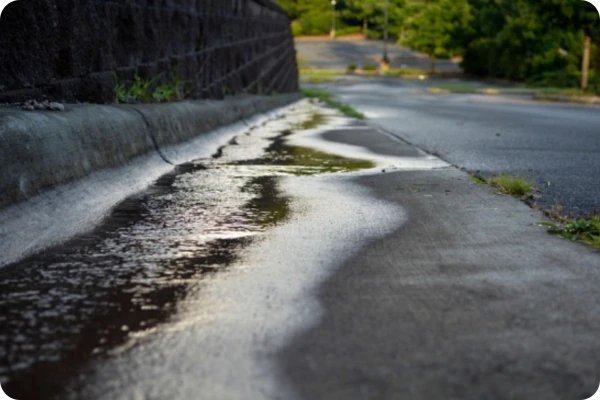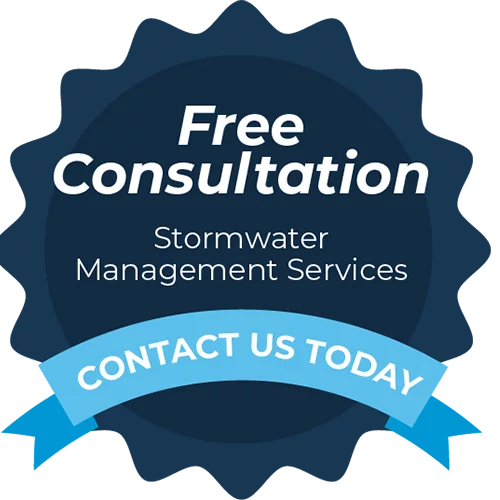The DC Metro Area faces significant stormwater runoff challenges. When rainwater flows over urban landscapes, it picks up various pollutants, which eventually enter local waterways and cause serious environmental and health concerns. Understanding the most common pollutants can help property managers and businesses implement effective stormwater management practices.
1. Chemicals
Chemicals, including fertilizers, pesticides, automotive fluids, and industrial solvents, are among the most prevalent pollutants in stormwater runoff. These substances are often found on lawns, roads, parking lots, and construction sites.
Why They’re Common:
- Fertilizers and pesticides are widely used in landscaping and agriculture.
- Automotive fluids like oil and antifreeze frequently leak from vehicles.
- Industrial and construction sites often involve the use of hazardous chemicals.
Hazards They Pose:
- Aquatic Life: Chemicals disrupt aquatic ecosystems by contaminating water sources, harming reproductive systems, and reducing survival rates in fish and other wildlife.
- Human Health: Drinking or coming into contact with contaminated water can lead to illnesses, including neurological and developmental issues caused by prolonged exposure to toxins.
Prevention Tips:
- Regularly inspect and maintain vehicles to prevent leaks.
- Use eco-friendly alternatives to traditional fertilizers and pesticides.
- Ensure proper containment of chemicals on construction and industrial sites.
2. Food Waste
Food waste, including discarded packaging and cooking oils, is a surprising but significant contributor to stormwater pollution. This waste often ends up littering streets before being swept into storm drains by rain.
Why It’s Common:
- Improper disposal of food containers and wrappers.
- Cooking oils dumped into outdoor drains instead of being properly recycled.
Hazards It Poses:
- Environmental Damage: Slow degradation of food packaging releases harmful substances into waterways.
- Flooding Risks: Litter clogs storm drains, leading to flooding during heavy rainfall.
-
Marine Ecosystems: Decomposing food waste depletes oxygen levels in water, threatening aquatic life.
Prevention Tips:
- Dispose of food waste and packaging properly in designated bins.
- Recycle cooking oils and avoid dumping them outdoors.
- Educate employees and tenants on responsible waste disposal practices.
3. Cigarette Butts
Cigarette butts are small but potent pollutants. They contain harmful chemicals like nicotine, arsenic, and lead that can leach into water systems.
Why They’re Common:
- Widespread smoking in public areas.
- Lack of proper disposal options such as outdoor ashtrays.
Hazards They Pose:
- Aquatic Life: Chemicals in cigarette butts are toxic to fish and other marine organisms.
- Water Quality: Contamination from cigarette chemicals can impact drinking water sources.
Prevention Tips:
- Install cigarette disposal stations in high-traffic areas.
- Run awareness campaigns about the environmental impact of littering cigarette butts.
4. Human & Animal Waste
Animal droppings and human waste are common stormwater pollutants, particularly in areas with high pet ownership or inadequate sanitation systems.
Why It’s Common:
- Pet owners neglect to pick up after their animals.
- Stormwater systems become overloaded due to improper waste management.
Hazards It Poses:
- Bacteria and Pathogens: Waste introduces harmful microorganisms into waterways, posing health risks to humans and animals.
- Ecosystem Disruption: Excess nutrients from waste promote harmful algal blooms that deplete oxygen levels in water.
Prevention Tips:
- Always clean up after pets and dispose of waste in designated bins.
- Implement proper sanitation facilities in areas prone to human waste pollution.
- Regularly inspect and maintain septic systems to prevent leaks.
Partner with iSTORMWATER for Effective Solutions
Combating stormwater pollution is a shared responsibility. By addressing these common pollutants, property managers and business owners can play a significant role in protecting our waterways. iSTORMWATER offers comprehensive stormwater runoff management and preventative maintenance services for commercial properties in the DC Metro Area.
Take Action Today:
- Safeguard your property and the environment.
- Get professional advice tailored to your stormwater needs.
Call iSTORMWATER at (410) 231-3455 to schedule a consultation and take the first step toward effective stormwater management.
Real Results
iStormwater LLC was an excellent choice. They made the process of the Stormwater pond repairs seamless. They took charge of the project and got the project approved and passing the inspection. We highly recommend them and would use them again.
Incredible stormwater management service. The owner John consulted on a property I manage and ended up saving us thousands of dollars in environmental fees from the government. Now, our property is compliant with the EPA and we have a great partner to keep us maintained on stormwater regulations over time.
So helpful with all of my water issues.
Great communication and leadership and a family friendly atmosphere. Thank you John!
Stormwater outfalls are one of the most overlooked - but critically important - components of a stormwater management system. While they often sit at the...
- Annapolis
- Anne Arundel County
- Baltimore County
- Baltimore
- Bel Air South
- Bethesda
- Bowie
- Cecil County
- Charles County
- Columbia
- Gaithersburg
- Glen Burnie
- Howard County
- Montgomery County
- Pasadena
- Prince George’s County
- Rockville
- Severna Park
- St. Mary’s County




